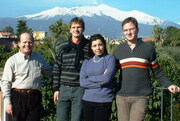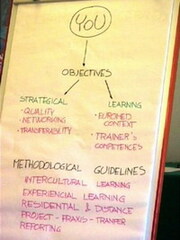TOTEM - Training of trainers in EuroMed
| Course completed!! |
|---|
| No participants' selection |
Background-rationale and nature-format of TOTEM
TOTEM (Training of Trainers in Euro-Med) is one of the two long-term training courses on training developed at institutional level within the Euro-Med area. TOTEM has been designed to support the learning of those youth workers and youth leaders – already experienced in Euro-Med – who manifested their will/need to develop their competences as trainers in this field.
More specifically, TOTEM responds to the need of developing specific EURO-MED-related competences in the field of training and tries to address a very specific target group of candidates, its existence being part of an overall bigger strategy which encompasses also other initiatives, such as TATEM (Training for Advanced Trainers in Euro-Med) by the EU-CoE partnership and ToT for European Youth Projects by the National Agencies of the YOUTH Programme.
In relation with the recent enlargement of the European Union which enables eastern European countries to develop projects with Meda ones, TOTEM wants to respond to the increased need of transferability of training concepts and experience, dedicating part of its implementation to the self-reflected acquisition of the necessary competences.
TOTEM is part of the SALTO Euro-Med training strategy for the years 2005 and 2006. It constitutes a complementary training course to TATEM (Training for Active Trainers in Euro-Med), the latter addressing those who are already engaged in training activities within Euro-Med.
Objectives
Strategical objectives
- To contribute to the quality improvement of training activities in Euro-Med
- To contribute, together with TATEM, to the development of a network of trainers at a Euro-Mediterranean level which will contribute to the quality of training activities in the Euro-Mediterranean context based on the acquired skills and competences.
- To contribute to the effective and bi-directional transfer of training experience between new EU member countries and Meda countries, with specific attention to possible similarities (and taken-for-granted differences) in the socio-economical background of these two areas.
Learning objectives
- To support the participants deep comprehension of the Euro-Mediterranean context (with all its cultural, historical, political, emotional implications)
- To improve and deepen the specific training competences of the course participants (future trainers in Euro-Med) for them to be able to competently design, implement, and evaluate youth worker training activities in this context.
Profile of participants
The participants of TOTEM:
- are youth workers / youth leaders who have some experience in the field of Euro-Med;
- want to become trainers in this context;
- are able to work well in English or French;
- are motivated to contribute to the learning process of the training course;
are committed to attend for the full duration and in all phases/elements of the course.
Participants’ competences and learning strands
Participants’ competences
TOTEM is not only being designed around a curriculum of competences. But the curriculum itself is a relevant reference point for deciding different aspects of the training. TOTEM will – above all – focus on the reflection on the concept of competence itself, trying to propose the participants with different ideas and models, and inviting them – however – to always analyse the competence in its various aspects, such as for example skills, knowledge, attitudes.
In particular TOTEM will try to focus very much on the so called “soft skills” (and attitudes) of the trainer, these being the most difficult ones to be processed during a learning experience but also being of extreme importance when working within the Euro-Med context.
Learning strands
In order to develop the above mentioned competences and looking at the learning processes which will take place in TOTEM, we can find some learning strands which cross and give coherence to the whole course. Those learning strands are:
- Learning in the group.
- Learning as a trainer.
- Learning as a self-directed learner.
- Learning about Euro-Med aspects.
Methodology
The following have been individuated as the main methodological guidelines for TOTEM
- Intercultural Learning (ICL)
- Experiential Learning
- Combining various approaches
- Linking residential seminars and distance learning
- Being project-oriented
- Stress on the evaluation
- Written production and reading
Specificities of training in Euro-Med
The following have been individuated as the main specificities of training in the Euro-Med context. They are not an exhaustive list but they constitute the core around which the training action is being planned:
- Relevance of global situation, policies, and tendencies in defining the setting.
- Role played by languages during the learning processes.
- Importance of religion.
- Strong need of conflict competences and mediation skills by the side of the trainer.
- Relevance of gender issue.
- Venues as learning tools.
- Impact of the concepts of leadership and membership on learning processes.
- The effectiveness of experiential learning in guiding the participants into a process of change.
- Need of supporting and developing the co-operation between Eastern Europe & Meda countries.
Phases of TOTEM
Beside of everything mentioned above, TOTEM can be also considered – on the timeline – as a series of 5 subsequent steps, all of them with a certain specificity and with equal importance:
- An introductory seminar, held in Italy, focussed on the acquisition of skills and knowledge and to the set-up of training projects by participants.
- A period of time devoted – for participants – to finish writing their projects and present them on the 1st June 2005 deadline. During this period of time mentoring begins.
- A second seminar, held in Egypt, that – starting from the intermediate evaluation of the process – offered the chance to go more in depth with different training issues. The seminar focussed on the skills needed to implement training action.
- A period of time devoted for participants to implement their training projects. Mentoring continues.
- A final seminar, held in Poland, analysed the outcome of participants’ projects, assessed their learning, worked on training quality criteria.
Along the TOTEM process and through planning, implementing, and evaluating a concrete training project, participants will have to focus on different roles as trainers. Provided that a trainer must be able to be the three of them at the same time, participants' attention will gradually be driven from trainer being a conceiver of a format or concept to be its implementer yet finishing to be its evaluator in the broader sense of the word, thus being able to adapt and transfer the original concept to new realities and contexts.
The following downloads are available
 The organisers of TOTEM
The organisers of TOTEM
fltr: Bernard Abrignani (SALTO),
Guiseppe Gualtieri (IT), Gehad Amer
(EG) and Pawel Aleksandrowicz (PL)
